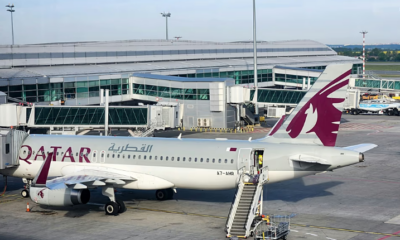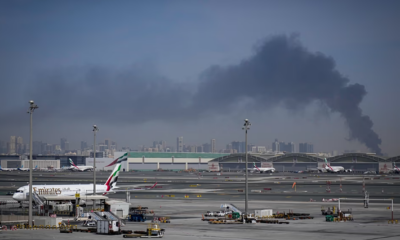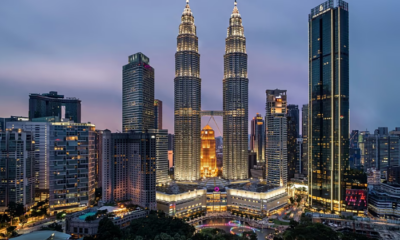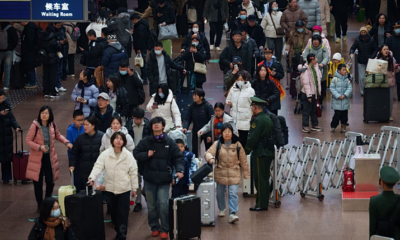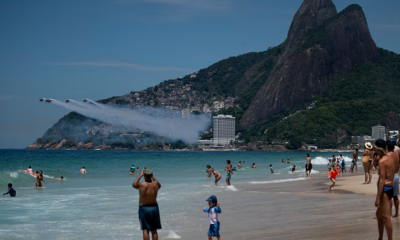Travel
Seismic Activity Rattles Southern Europe: What Travellers Need to Know About Insurance Coverage

A surge in seismic activity across Southern Europe is raising concerns for summer holidaymakers, as popular destinations such as Crete, Santorini, Sicily, and coastal Turkey have experienced a wave of earthquakes and volcanic eruptions in recent weeks.
While the risk of being directly impacted remains low, the heightened geological unrest has prompted many travellers to reconsider their plans. However, experts are urging caution—not just about safety, but also about the limits of standard travel insurance.
Most Basic Policies Don’t Cover Natural Disasters
According to travel insurance experts, most standard policies do not include protection against cancellations caused by natural disasters. “Travellers must be aware that most travel insurance policies won’t cover earthquakes or other natural disasters as standard,” said Ernesto Suarez, founder of Gigasure, an insurance provider. “Events outside of anyone’s control are extremely difficult to underwrite.”
Despite this, many insurers offer optional add-ons that provide additional protection. Simon McCulloch, commercial director at Staysure, explained that enhanced policies can cover disruptions due to earthquakes, floods, or wildfires—provided the traveller’s trip is directly affected and non-refundable. Gigasure’s upgraded package even includes coverage for unexpected accommodation and transport costs, pet-sitting expenses, and daily allowances for delays abroad.
What to Do if a Disaster Strikes While You’re Abroad
If an earthquake or volcanic eruption occurs while you are already at your destination, the immediate priority is safety. “The most important thing is to get yourself to safety and follow local authorities’ advice,” McCulloch advised.
Afterward, travellers are urged to contact their airline, tour operator, or travel provider to explore options for early return or relocation to safer accommodation. Those with extended insurance coverage may also be eligible for reimbursements on unused bookings or additional travel costs. In such cases, providers like Gigasure offer to extend policy durations for up to 30 days or until safe return is possible.
Cancelling Out of Caution May Not Be Covered
Feeling uneasy about visiting a quake-prone area is understandable, but unless official travel warnings are issued, cancellations made out of caution are unlikely to be covered by insurance.
“Unless your government issues specific travel advisories against visiting an area—such as advising against all but essential travel—standard policies won’t reimburse you if you choose to cancel out of concern,” McCulloch noted. Recent tremors in Crete, for instance, have not prompted formal restrictions, despite a reported drop in tourism bookings.
Tourism Impact Already Being Felt
In Santorini, one of Greece’s most popular tourist spots, local officials estimate a potential 25% decline in arrivals this year due to seismic fears. Still, most destinations remain safe for travel, experts emphasize.
Travellers are encouraged to review their policies carefully, consult their insurers about what is and isn’t covered, and monitor official advisories from relevant authorities before departure. “Natural disasters are unpredictable,” McCulloch said, “but your insurance coverage shouldn’t be—provided you’ve taken steps to understand what protection you really have.”
Travel
Qatar Extends Visas for Stranded Travellers as Airspace Closure Continues
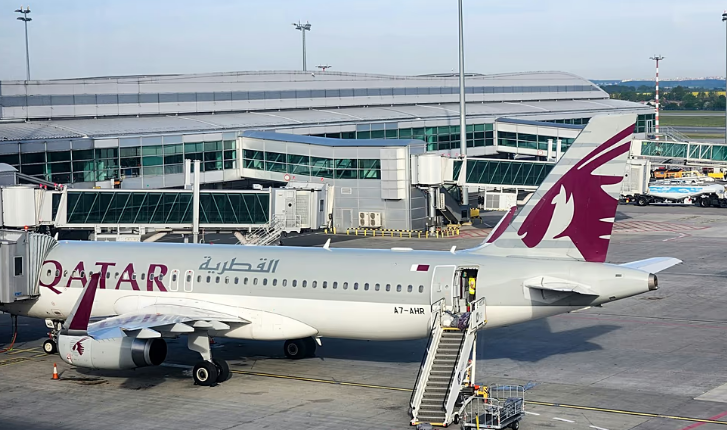
Ministry of Interior Qatar has announced that entry visas for travellers stranded in the country due to the ongoing airspace closure will be automatically extended for one month without additional fees.
The measure applies to all visa categories and will be processed electronically, with no action required from affected visitors. Authorities said further extensions could be introduced depending on how the situation develops.
However, travellers whose visas expired before 28 February, when Iran’s retaliatory strikes began and regional tensions escalated, will still be required to pay any overstay fines accumulated before that date.
Qatar allows citizens of 102 countries to obtain a free visa on arrival, with the permitted length of stay varying by nationality. Most European passport holders are eligible for stays of up to 90 days, while others receive a 30-day visa that can be extended for an additional 30 days.
The country’s airspace was closed shortly after noon local time on 28 February, according to the Qatar Civil Aviation Authority. Since then, there have been no commercial flights operating in or out of the country.
Qatar Airways has been issuing daily updates confirming the continued suspension of services, with announcements typically made before 9 a.m. local time. The airline said the next update is expected on 4 March.
Passengers holding bookings with Qatar Airways for travel between 28 February and 10 March 2026 can reschedule their trips within 14 days of their original departure date or request a full refund. The airline said changes can be made through its website or mobile app and urged only those travelling within the next 48 hours to contact customer service directly due to high call volumes.
While the United Arab Emirates has started operating limited exceptional flights to repatriate stranded passengers, Qatar has not yet resumed any inbound or outbound commercial operations.
The disruption has also affected travel in Southeast Asia. In Thailand, authorities said visit visas would be extended for tourists unable to leave due to flight cancellations to the Middle East. At Bangkok’s Suvarnabhumi Airport, 47 flights have been cancelled, along with 36 flights to and from Phuket.
Airlines impacted include Air Arabia, Emirates, Qatar Airways, Etihad Airways, Gulf Air and Kuwait Airways.
Thailand’s Ministry of Tourism and Sports said hotels have been asked to offer discounted rates to affected visitors as authorities work to ease the disruption.
Travel
Middle East Authorities Warn Against Sharing Footage of Iranian Strikes on Social Media
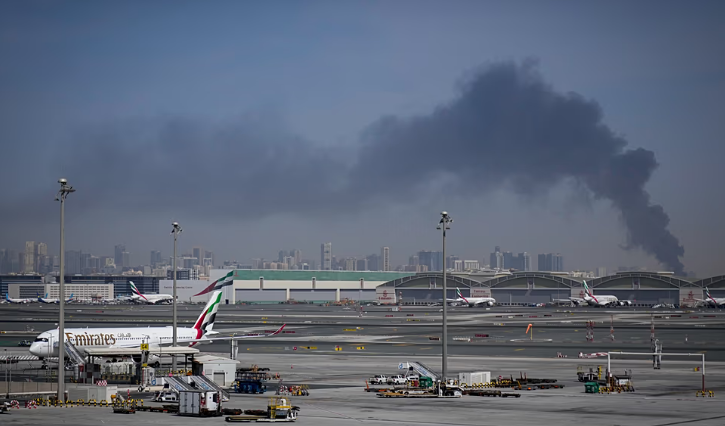
Authorities across the Middle East are cautioning residents, citizens, and visitors about sharing images and videos of Iranian retaliatory strikes, citing security risks and potential legal consequences.
Authorities have restrictions around sharing such images for security purposes and to prevent the spread of fake news. Social media has been flooded with footage from influencers and tourists showing missile interceptions and other military responses in the region. Officials warn that posting such content could reveal the locations of defensive installations or provide information that may aid future attacks.
The concerns are not unique to the region. Similar rules are in place in Ukraine, where the ongoing conflict with Russia has prompted authorities to limit the circulation of footage from conflict zones.
In Bahrain, two people were arrested on February 28 for posting live footage of strikes on social media. The Ministry of Interior said anyone filming, posting, or reposting videos from the scene could face legal action. “This constitutes a legal violation that could harm security and public order,” the ministry stated on X.
Kuwait’s Ministry of Interior issued comparable guidance, asking citizens to refrain from filming missile interceptions or authorities carrying out their duties. The ministry said such content could cause public anxiety, disrupt security operations, and spread inaccurate information. Legal measures will be taken against anyone sharing rumours or misleading news.
Qatar’s Ministry of Interior emphasized avoiding the circulation of images or videos of the aftermath to prevent legal liability. The Dubai Media Office issued similar advice, urging residents to rely on official sources for updates.
Authorities stress the importance of following verified channels for information. Bahrainis can access updates through @moi_bahrain and @bna_en, while UAE residents should refer to @DXBMediaOffice and @ADMediaOffice. Qataris are advised to follow @QNAEnglish and @MOI_QatarEn, and Kuwaitis can check @kuna_en and @Moi_kuw. Jordan and Saudi Arabia have also set up official accounts for timely updates, including @PetranewsEN, @moi_jor, @Spa_Eng, and @MOISaudiArabia.
Several embassies are providing updates to their citizens who register with them. International news outlets such as Euronews are also offering live coverage, with bureaus in Doha and Dubai running continuous updates on their website.
Officials emphasize that following these guidelines protects public safety and ensures accurate reporting during a period of heightened regional tension. Authorities warn that disregarding the rules could carry serious legal consequences, highlighting the need for vigilance and restraint when sharing information online.
Travel
Ryanair Ranks Last in Which? Airline Satisfaction Survey as Jet2 and Singapore Airlines Lead
-

 Entertainment2 years ago
Entertainment2 years agoMeta Acquires Tilda Swinton VR Doc ‘Impulse: Playing With Reality’
-

 Business2 years ago
Business2 years agoSaudi Arabia’s Model for Sustainable Aviation Practices
-

 Business2 years ago
Business2 years agoRecent Developments in Small Business Taxes
-

 Home Improvement1 year ago
Home Improvement1 year agoEffective Drain Cleaning: A Key to a Healthy Plumbing System
-

 Politics2 years ago
Politics2 years agoWho was Ebrahim Raisi and his status in Iranian Politics?
-

 Business2 years ago
Business2 years agoCarrectly: Revolutionizing Car Care in Chicago
-

 Sports2 years ago
Sports2 years agoKeely Hodgkinson Wins Britain’s First Athletics Gold at Paris Olympics in 800m
-

 Business2 years ago
Business2 years agoSaudi Arabia: Foreign Direct Investment Rises by 5.6% in Q1

